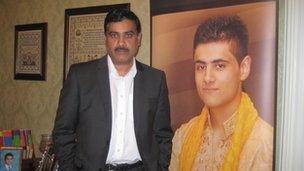Scalpel-free post-mortem UK launch
- Published
How the non-surgical technique works
Pathologists in the UK can now conduct full post-mortem examinations using a touch screen instead of a scalpel.
England and Wales chief coroner Peter Thornton QC is opening a £3m digital post-mortem examination facility in Sheffield's Medico-Legal Centre.
It aims to reduce the stress and upset families feel when the remains of a relative have to be dissected.
It has been welcomed by Jewish and Muslim people, whose faiths stress non-violation of the body and quick burial.

Ramzan Mohayuddin had to wait five days for the body of his son, Saad
Ramzan Mohayuddin, of Bradford, told the BBC he had had to wait five days for the body of his son, Saad, 18, who died in his sleep on 25 December 2008, to be returned following a post-mortem examination.
"I felt powerless as a father to prevent this happening," he said.
"I saw what they did to my son and the way he was cut up and sewn together like a sack."
He has set up a registered charity, the Saad Foundation, external, to help families in similar situations.
Owais, the first son of Mohammed Ilyas, also of Bradford, died in hospital aged four months.
But after the post-mortem examination, to determine the exact cause of death, Mohammed felt unable to wash the body before burial, an Islamic tradition.
"I could not bathe my son," he said
"I did not have the courage or strength to see he had been cut up."
The Saad Foundation has been campaigning for the NHS to offer all families the choice of non-invasive post mortem techniques.
"It is the way forward," said Mr Mohayuddin.
"Everyone has the right to lay their loved ones to rest with peace and dignity."

Owais, the first son of Mohammed Ilyas, died in hospital aged four months.
Hi-tech 3D digital imaging software, connected to a computerised tomography (CT) or magnetic resonance imaging (MRI) scanner, allows pathologists to zoom in to areas of the corpse they want to study in greater detail and strip away layers of clothes and tissue without having to cut them.
Home Office pathologist Prof Peter Vanezis said: "It's very difficult to find investment to put the scanners in to public mortuaries around the country."
About 550,000 deaths are recorded each year in England and Wales, of which around 100,000 require a post-mortem examination - one of the highest rates in the world.
The average cost of a post-mortem examination is about £1,000.
Coroners services are usually funded by local authorities.
By installing them, local councils can give relatives the choice of a free conventional post-mortem examination or a digital one for about £500.
Malaysian company iGene, external has become the first to package the process and sell the technology, at a cost of £50m.
It hopes to open a further 18 facilities across the UK by 2015.
The next centre will open in Bradford early next year.
Council Deputy Leader Imran Hussain said: "No-one wants to put their loved one through an invasive post-mortem, regardless of their background and religion.
"Bradford is leading the way forward."
The company's Matt Chandran said: "We are transforming a century-old system into a completely new digital environment."
But last year a report on cross sectional imaging, external, by the Royal College of Pathologists and the Royal College of Radiologists, said: "It's unable to confirm some of the most common causes of death including coronary heart disease and it recommends that in many cases an invasive autopsy be carried out."
- Published21 September 2013
- Published4 January 2011